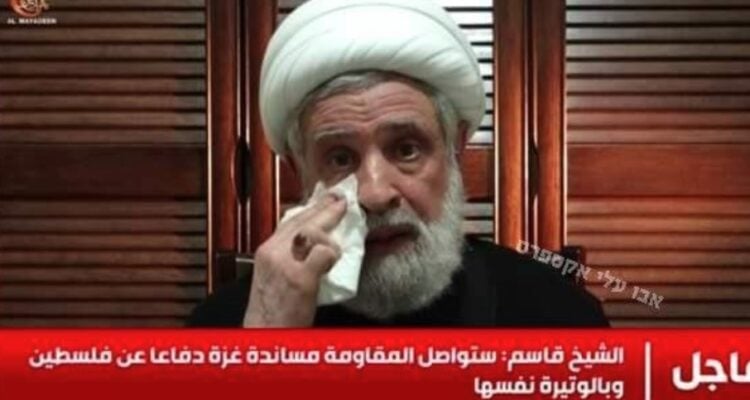Qassem’s statement implies that Hezbollah may be surrendering the demand for a ceasefire in Gaza as a precondition for a truce between Hezbollah and Israel.
By Vered Weiss, World Israel News
Naim Qassem, the most senior Hezbollah leader after the assassination of Nasrallah and his successor Safieddine, has called for an unconditional ceasefire, apparently not contingent on a cessation of fighting in Gaza.
The former deputy to Hassan Nasrallah and member of Hezbollah’s Jihad Council announced on Tuesday night that the terror group was “agreeing to a ceasefire without preconditions. First, a ceasefire achieved through diplomatic means, and then we will discuss all the details.”
Experts believe that the announcement was issued at the behest of Iran and was prompted by the terror proxy’s military weakness after repeated Israeli strikes and assassinations of its leaders.
Given that Qassem is the highest-ranking Hezbollah official remaining alive, the request for a ceasefire is apparently an official statement from the terror group.
The request would entail both sides stopping the fighting before an agreement is mediated, most likely through the United Nations.
Qassem added, “If the enemy [Israel] continues its war, then the battlefield will decide.”
He added that he relied on Lebanese Parliament Speaker Nabih Berri to restore calm.
“We support the political activity being led by Berri under the title of a ceasefire,” Qassem said.
The statement signals a change in position for Hezbollah since the terror group had indicated, since it began firing missiles into Israel on October 8th, that it would not stop hostilities until Israel submitted to a ceasefire agreement with Hamas in Gaza.
Qassem’s statement implies that Hezbollah may be surrendering the demand for a ceasefire in Gaza as a precondition for a truce between Hezbollah and Israel.
US State Department spokesperson Matthew Miller explained that Israel has not yet accepted the ceasefire and that there is reason to distrust the request for a ceasefire from Hezbollah, particularly if the terror group refuses to retreat from Israel’s northern border back to the Litani River, as it was supposed to do after the Second Lebanon War according to the terms of Resolution 1701.
“Obviously, we don’t trust Hezbollah,” Miller said. “But you look at what Hezbollah said in 2006 when the UN Security Council adopted 1701… that they would implement 1701 – and they blew through all of their commitments.”
“So there is an obvious lack of faith in Hezbollah’s ability to do what it said in 2006 and do what it’s saying it would do now, which is agree to an actual ceasefire that would allow Israeli civilians to return home and allow Lebanese civilians to return home,” the State Department spokesperson said.
However, Miller said it was hopeful that Hezbollah had not spoken of a ceasefire in the 12 months of fighting and it was mentioning it now that the terror group is “getting battered, suddenly they’ve changed their tune and want a ceasefire. I think it’s not surprising given the situation they find themselves in,” he said.





